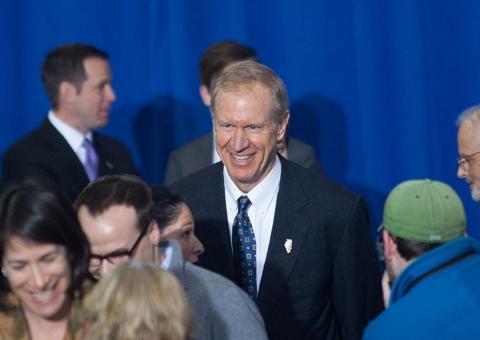Gov. Bruce Rauner is on track to spend $50 million on legislative races this year. Even for a guy like Rauner, that’s a lot of money – nearly twice what he spent on his own campaign two years ago. Two Rauner allies, billionaires Ken Griffin and Richard Uihlein, are also spending tens of millions of dollars. The end game is taking down unions and squelching voting rights.
In a sense, Rauner has turned the tables on House Speaker Mike Madigan, who for decades has controlled the legislature with his fundraising prowess. Most recently Madigan has exploited exemptions for party committees that he carved into 2009 campaign finance reform. Madigan’s operation was classic machine politics, insiders with common interests helping out each other with donations, contracts, appointments and favors.
Unions were part of the game, but – contrary to Rauner’s favorite conspiracy theory – unions representing public employees were sometimes expendable. Rauner actually knows this. He first came to political prominence as the local sponsor of Stand for Children, the education reform group that entered the Illinois political scene in 2010.
The group’s ploy was to tilt toward Madigan, who’d been abandoned by public sector unions angered over legislation that cut pensions. Rauner, Madigan and then-Mayor-elect Rahm Emanuel all cooperated in 2011 in passing legislation to curtail teachers’ collective bargaining power.
But while politicians like Madigan and Emanuel can raise huge campaign funds relying on their insider connections, Rauner is “a different animal” – a single individual who has enough money to singlehandedly push a radical change in public policy, said Brian Gladstein, executive director of Common Cause Illinois.
“If you have millions and millions of dollars and you’re willing to spend it, you can change policy,” Gladstein said. “But it means money drives policy, not democracy.”
The major policy change Rauner has in mind is to sharply curtail collective bargaining rights – and ultimately to “kill unions,” as the New Republic put it. Toward this goal, Rauner is willing to block the state’s budget and sacrifice social services and higher education.
Rauner’s electoral strategy has resulted in “insane amounts of money” being injected into local races, Gladstein said. In eight contested legislative races, spending is over $1 million, far higher than previous elections, Gladstein said.
That money is not going to promote public debate over Rauner’s agenda – he learned early in his term that attempts to sell his program merely inspired greater opposition – but simply to attack Madigan.
In the meantime Rauner has pushed back against efforts by Common Cause and other democracy advocates to expand access to the ballot. Since 2012 they’ve earned a number of victories, including online voter registration, same-day registration and, this year, automatic voter registration for residents obtaining or renewing driver’s licenses. Rauner vetoed automatic registration, and his allies went to court in an unsuccessful effort to block same-day registration.
While couched in terms of concern over the integrity of the ballot, both those moves are baldly political, aimed at limiting ballot access for people who might vote against Rauner and his candidates. Across the country, where Republicans have taken control of state government, they’ve enacted voter-suppression measures. What would Illinois Republicans do if they managed to take over this state’s legislature?
In Indiana and in Wisconsin, Republicans have passed laws requiring photo ID laws for voters. Republicans in Wisconsin and Ohio have cut back early voting. In Wisconsin and Ohio, trial courts found these measures were racially discriminatory, but were overruled by appeals courts. Rauner has cited Wisconsin Gov. Scott Walker as a model.
Once known as the Wild West of campaign finance regulation, Illinois is in danger of becoming the Brave New World of elite power politics, with voting rights one of the casualties.
Curtis is a blogger for The Chicago Reporter..
The Chicago Reporter is a nonprofit investigative news organization that focuses on race, poverty and income inequality. The Reporter was founded by civil rights activist John McDermott in 1972 to measure the city's progress toward racial equality. Support the Chicago Reporter with a donation.


Spread the word